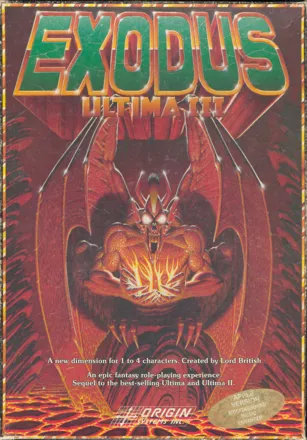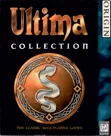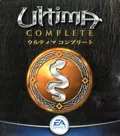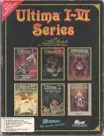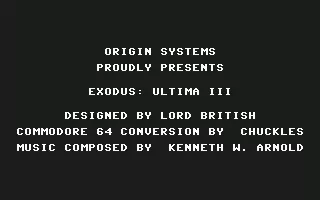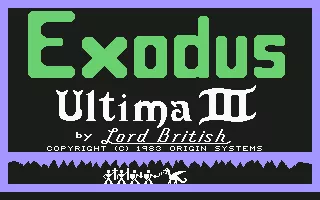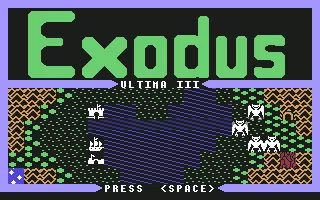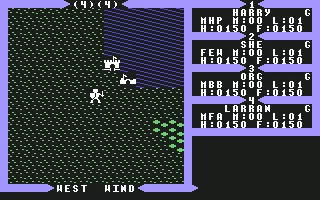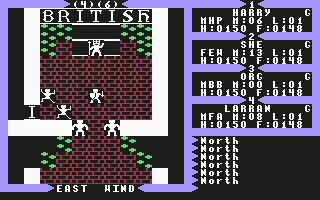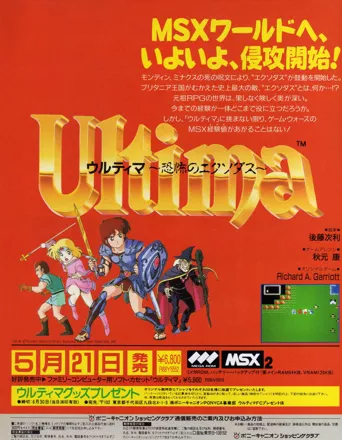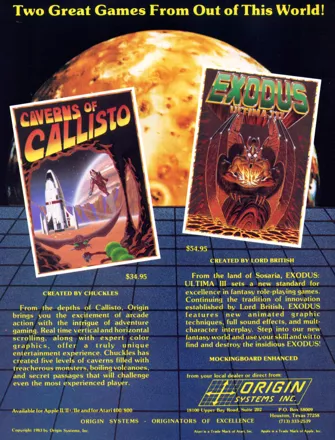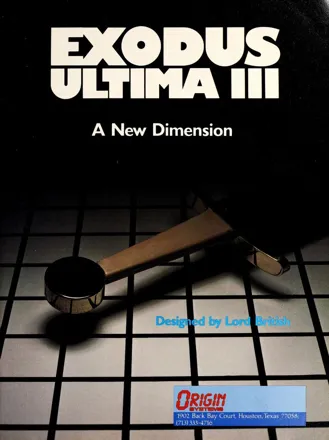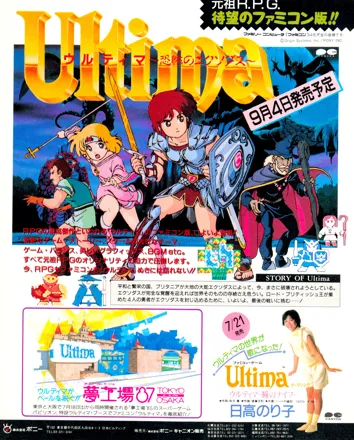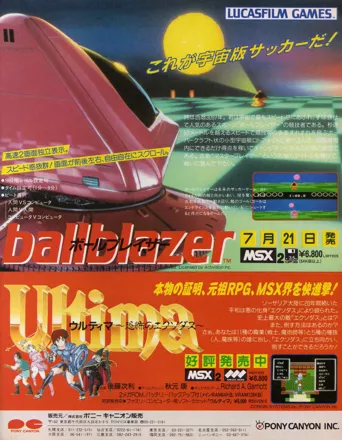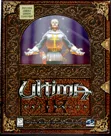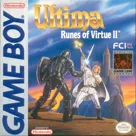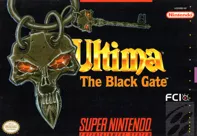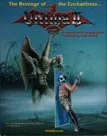Exodus: Ultima III
Description official descriptions
After the defeat of the evil wizard Mondain and his mistress Minax in the previous two Ultimas, peace has returned to the land of Sorsaria. Times passes and eventually geological disruptions and a resurgence of the monster populace occur, and it is soon learned that Mondain and Minax had conceived a child named Exodus before their death. Now that child has become an adult with the power to avenge the death of his parents. Obviously, it falls upon the hero from Earth to find and stop him.
The third title in the Ultima series was the first to feature a party of adventurers instead of a single player character. The party is created at the beginning of the game by assigning various class combinations and determining the characters' attributes. The game has larger and more detailed towns, populated by NPCs the protagonist can converse with to obtain clues. Like in earlier Ultima games, exploration is divided between top-down overworld locations and first-person 3D dungeons. This installment introduces separate combat screens where player-controlled party fights multiple monsters in a turn-based tile-based system.
Spellings
- ウルティマ3 エクソダス - Japanese spelling (PC-98 title)
- ウルティマ〜恐怖のエクソダス〜 - Japanese spelling (MSX version)
Groups +
- Fantasy creatures: Dragons
- Fantasy creatures: Dwarves
- Fantasy creatures: Elves
- Fantasy creatures: Goblins
- Fantasy creatures: Griffins
- Fantasy creatures: Orcs
- Fantasy creatures: Trolls
- Gameplay feature: Horse riding
- Gameplay feature: Hunger / Thirst
- Games made into comics
- Physical Bonus Content: World Map
- Protagonist: Female (option)
- Ultima series
- Ultima universe
Screenshots
Promos
Videos
See any errors or missing info for this game?
You can submit a correction, contribute trivia, add to a game group, add a related site or alternate title.
Credits (Commodore 64 version)
| Designed by | |
| Commodore 64 Conversion by | |
| Music composed by |
Reviews
Critics
Average score: 76% (based on 12 ratings)
Players
Average score: 3.7 out of 5 (based on 139 ratings with 7 reviews)
This game actually made me like CGA graphics.
The Good
The packaging for this game was unlike any other that I'd seen at the time. (early 80's) A cloth map, spellbooks with textured covers, each printed on heavyweight paper. The ultima world was HUGE for a game that came on 1/2 of a 360k disk. (the other half was the character/user disk)
The Bad
Considering the timeframe this game was released in, absolutely nothing.
The Bottom Line
There was so much attention to detail in this game. From the above mentioned extras in the packaging, to being able to have a party of adventures, each separately controllable in combat scenes, to the scale of the ultima world itself, with dungeons and towns and castles to explore. The game is somewhat complex at first, with each key on the keyboard controlling different elements of the game, but the learning curve is fast enough that the keyboard control seemed natural within a few hours.
After reading the other reviews of this game mentioning the lack of music, I honestly didn't even realize it was missing on the PC version. Like the other reviewers, this was my first RPG game, and I was so engrossed in the storyline and building up my characters that I actually played this game consistently for over a year. I just couldn't get away from it. I played this game so much in fact, that I was depressed that Ultima IV used EGA (16 color) graphics. It just didn't look right to me!
DOS · by jeff leyda (1856) · 2000
At least it's not as bad as the Ultima 7 port.
The Good
The absolute best thing about this port is the music. The original computer versions of this game were old enough that the most you had to look forward to were the standard blips, bleeps, and blorps of the PC speaker. Fans eventually created a MIDI patch to add music to the game, but even those songs don't compare to Pony Canyon's musical offerings.
Particularly haunting is the opening theme. It starts with a low hum, then grows into a discordant, running harmony, interrupted with the occasional off key effect. Something about it all just clicks.
The other nice thing I can say about this port is that it's fairly faithful to the original game in terms of the game structure, though it has all of the obligatory limitations of a port to a console. Less text, fewer commands, etc.
The Bad
First of all, no way around it, this game is ugly. Even the stick figure graphics of the Apple II version hold up better than this mess. The characters have about as much definition and charm as a smudge, and not the kind that you can see the Virgin Mary in.
Graphics may not be everything, but this is a third/fourth generation game, released in Japan in 1987. That's the same year as Final Fantasy. Looking at it, you can just tell they didn't spend a dime more than they had to to get the graphics finished. This stands in especially appalling contrast to the superb musical score.
Like a lot of RPGs of it's era, this game is ludicrously difficult at times and is horribly unbalanced. The instruction manual that shipped with the game is bare bones, telling you little to nothing about what the different classes are and do, or what the implications of choosing one race over another are.
Many of the classes are redundant or overlap in some fashion or another. I don't know for certain if this is a flaw of the original or if this version is simply bugged, but there's no good reason to not fix these flaws if they were a holdover, or at least warn players that the bard and ranger classes are worthless.
The combat system is often aggravating. Particularly, it's difficult to level up certain classes because they can't use ranged weapons. Weapons in general are pathetically weak too. The magic users have attacks that are instant death for goblinoids or undead, respectively, making choosing a fighter class kind of moot, especially early on. Enemies can attack you at any angle, but you can only attack in the cardinal directions, leading to a lot of cheap shots. I could go on here, but I think you get the point.
The limitations in the text mean the clues and hints that NPCs give you are pretty cryptic a lot of the time. In the original, if you asked the right question, you'd get a paragraph or more to work with. Here, you don't have to know what to ask, but you get a line or two at best.
There's a lot of stuff in the game that's completely irrelevant to the plot so you can wind up running around on what are not exactly side quests, wasting your time on doing things that ultimately grant you nothing in exchange.
The Bottom Line
The first three Ultimas were more like giant puzzles than stories.
Unlike traditional RPGs, leveling up only increased your HP, as well as the difficulty of enemies that would show up on the map. In order to increase your stats, you had to pay one or more particular NPCs or shrines, or some such thing.
There was always a city or dungeon that could be raided over and over to produce the needed booty, so it was just a matter of stumbling upon the trove. Once loaded up, you visit your shrine and pump your stats. In this way, you were actually punished for leveling up too much until you could bribe your way to full strength.
If you're looking for a console RPG, there's only about an hour's worth of gaming in here. No, the game takes longer to complete, a few hours if you know what you're doing, much longer if you don't, but you only actually play the RPG part of it for a fraction of that time. The rest is spent on executing this repetitive loop of stealing, bribing, etc.
You might like this if you're a die hard fan, but really, this game is mostly a chore. Spend the time more wisely and clean your bedroom or something.
NES · by Nancy "Infested" Kerrigan (36) · 2011
The Good
This is the first game in the series that really feels like a Ultima. It has a lot of the standard elements that were in the later games such as moon-gates, an underworld and familiar towns like Yew. The modern technology has gone and the game takes place in a true fantasy environment. The game also has a musical soundtrack (with the upgrade patch) which although basic helps the atmosphere no end.
You control a party of four adventurers and combat takes place on its own screen, where you can move your characters around, attack or cast spells in turns. This is far more interesting than the mindless attacking from the earlier games.
The characters in the towns still only offer one line of conversation but there are far more characters that have something worthwhile to say. These tend to be hints you need to complete the game, and it adds another gameplay element where you have to search through the towns to get all these clues.
The game also adds line of sight so you can't see around corners, and viewing distance is limited in forests.
The Bad
Some of the spells are not as useful as they should be. The light spell lasts about 8 turns before you are in the dark again and with wind blowing out your torches all the time, you need a serious supply before tackling any dungeons. The clerics heal spells seemed a bit underpowered at the start of the game but are even worse later on.
Ships are far too rare, in this game considering you need one to show up before you can finish the game.
The Bottom Line
This game is a real classic - the beginnings of everything that Ultima developed into can be seen here. The gameplay is far more balanced and varied than the previous games and it doesn't feel like a load of elements thrown together ad hoc. It was fun to play through 25 years after it came out. I did use the upgrade patch from http://exodus.voyd.net. This adds a frame limiter, midi music (previously missing on the PC), EGA graphics and also a very useful restore hot-key (this required a restart otherwise).
If you are an Ultima fan and can see past the technology, this game is still worth playing even these days. Back in 1983, had I been old enough to appreciate it, it would have been truly outstanding.
DOS · by Pix (1172) · 2008
Discussion
| Subject | By | Date |
|---|---|---|
| PC-98 version - remake? | Trypticon (11023) | Mar 8, 2011 |
Trivia
Certificate
Starting with Exodus, Origin began offering certificates, signed by Lord British, to players who completed the games.
Game Boy Color port
In 2001 Sven Carlberg made an unofficial port of Ultima III: Exodus to the Color Game Boy, featuring graphics and music largely adapted from the C64 version, fortified with an additional game following the completion of the regular game. A year later, he released its source code. For more (including free download of the playable version!) check http://gonow.to/sven/
Japanese Song
The theme song of the Japanese Famicom and MSX game was a digitised version of a song released concurrently with the game, ウルティマー瞳のナイフー (Ultima - Knife of the Eye), sung by Noriko Hidaka.
Lord British
This is the first Ultima in which Lord British's hit points are static (you can't lower them), making him unkillable in combat. In the first two games British had a ton of health but could eventually be killed by a strong enough character. From Ultima III onward, British is unkillable by normal means.
However, he still can be killed. There's a boat in his castle behind some locked doors that can be used to sail around the moat in. Get British pissed off by wacking one of his jesters then head towards the boat and sail to the front of the city. Wait there until he shows up and cut loose on him with the ship's cannons.
PC version
There is no music in PC version, but there exist a freeware patch that adds all the music from Apple/C-64 -versions to play properly with the PC version as MIDI. There are a freeware EGA graphics patch available as well.
Most people don't know that the IBM PC port is supposed to be played on an IBM CGA with a *composite* color monitor. Using that configuration, the pink-striped borders become a solid dark blue, the white-speckled road tiles become a bright red, and the cyan trees appear as green.
Remake
An unofficial shareware remake for Macintosh of this game was created and released by Lairware, featuring improved graphics including color and detailed sprites (hair, faces, etc).
Title
The title, Exodus, is a nice irony, considering that Lord British took leave of Sierra to found his own company, Origin, during the game's development.
Awards
- Computer Gaming World
- November 1985 (Vol. 5.5) - Adventure Game of the Year (Readers' Choice)
- March 1988 (Issue #45) – Introduced into the Hall of Fame
- November 1996 (15th anniversary issue) – #144 in the “150 Best Games of All Time” list
- November 1996 (15th anniversary issue) – #15 Least Rewarding Ending of All Time
- Electronic Gaming Monthly
- December 1989 (Issue 5) - Best RPG Video Game (NES version)
- December 1989 (Issue 5) - Worst Ending in a Video Game
- GameSpy
- 2001 – #41 Top Game of All Time
Information also contributed by Eisentel, Jason Gilchrist, NewRisingSun, Pseudo_Intellectual and Ye Olde Infocomme Shoppe
Analytics
Related Sites +
-
SOUND/EGA/Windows XP Upgrade for Exodus
An upgrade for Exodus with more colors and sound support for WIN XP. -
Ultima III MAC upgrade
Exodus upgrade for MAC OS with new graphics and full music and speech support.
Identifiers +
Contribute
Are you familiar with this game? Help document and preserve this entry in video game history! If your contribution is approved, you will earn points and be credited as a contributor.
Contributors to this Entry
Game added by Alan Chan.
PC-88, Atari 8-bit, Sharp X1, FM-7, Macintosh added by Terok Nor. MSX added by koffiepad. PC-98 added by Unicorn Lynx. Atari ST added by Belboz. Commodore 64, Amiga, NES, Apple II added by Jeanne. Windows added by eWarrior.
Additional contributors: Rebound Boy, Unicorn Lynx, Corn Popper, Alaka, Игги Друге, BostonGeorge, Patrick Bregger, Narushima.
Game added February 21, 2000. Last modified November 25, 2024.


